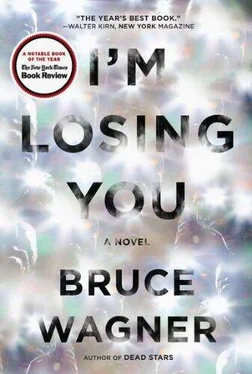She was six months away from her own bat mitzvah when her father died. With the swift move to Menlo Park, the uprooting was complete — Rachel never saw her friends from Beth-El again. No more carpools and sabbaths, Succot and shofars, no more kissing of mezuzim on doorsills. Calliope donated her husband’s “religious accessories,” as she called them — his tallit and siddur —to the synagogue the way old clothes would be left at the Salvation Army. Each year, tradition faded while the Christmas tree grew gaudily redolent, its blinking, snow-sprayed branches heavy with goyische trinkets.
She made new friends in Menlo Park, and nursed a secret terror. Rachel had expected her period to come with the bat mitzvah; when that was broken off, she panicked. One by one her girlfriends fell to the red cabal, but for her the stainless months came and went like white clouds latticed across the sky. At night, flashlight under covers, she reread her underlined Leviticus, desperate to be “unclean.” They had studied the strange book in Hebrew School, with its ancient laws of sacrifice and defilement, delineations of forbidden sex and catamenial superstition: Rachel wanted the curse. She wanted to turn wine to vinegar with her touch or rust iron at the waning of the moon. She wanted to make mares miscarry. It was said a woman on her period might cause the death of a man if she passed between him and another, and Rachel wanted to try that in the worst way — she wanted to feed her blood to the neighbor’s cat and see if it would die. She yearned to be unclean, like the animals with “true hoofs but no clefts through the hoofs,” like the creatures that lived in the water but had no fins or scales, like abominations of winged, swarming things: eagles and vultures, falcons and ravens, ostriches, kites, hawks and gulls, owls and cormorants and pelicans, bustards, storks, herons and hoopoes and bats. She wanted the rhythmic drama of murderous potency, unclean. And when the bleeding stopped, she wanted to bring turtledoves and pigeons to the priest “so that he might offer the one as a sin offering and the other as a burnt offering; and the priest shall make expiation on her behalf, for her unclean discharge, before the LORD.” So said the Torah, and this is what she read aloud. But the vaunted discharge would not come.
Until she was seventeen. The temple was awash in blood: she kept black beach towels in the dresser, rushing to menstrual intercourse. She wanted to be unclean and make others so. Through her twenties and thirties, Rachel studied laws of Taharah HaMishpachah regarding a niddah , or menstruant woman. This became her Jewishness and perversely circumscribed expertise — her Orthodox window of stained glass. Marathon running made her irregular; so the doctors said. With a sense of belonging, Rachel noted she was a zavah , “one who continues to bleed beyond the normal period of her menses or who has bleeding at a different time of the month.” During that impure time, anything one slept, sat or rode upon (California King, LifeCycle, Land Cruiser) became unclean. The Torah distinguished between two types of vaginal discharges: a mareh was accompanied by specific physical sensation, while a ketem came with no warning — the stain simply discovered. The woman must always consult a rabbi to determine her status. Was she clean or unclean, tehorah or niddah ? It depended on where the stain was found, its color and size. A ketem could only render a woman a niddah if it was the size of a circle around nineteen millimeters in diameter.
The woman must confirm by examination that the cyclical bleeding had ended. This was done with a three-inch-square cloth wrapped around the index finger, inserted deep into the vagina and rotated to detect any blood that might be hidden in the folds (a tampon wouldn’t do). The inspection could be done a number of times during the day, between douching. If questionable stains were still found on the cloth before sunset, it was to be put in an envelope and taken to a rabbi in the morning. At the end of seven spotless days, the woman would immerse herself in a bath called a mikvah; this was the only way to make the transition from tumah to taharah, tameh to tahor . It was necessary to submerge the entire body in the water, and the immersion must take place at night, “after at least three stars are visible.”
As the service ended, Rachel’s eye flitted to a passage in the book of Torah that she held in hand. It was a preface to Numbers and referred to the highest form of ritual defilement: contact with a human corpse. The rabbis called the human corpse “the father of fathers of impurity.”
The Red Cow; Laws of Purification
The rules regarding the red heifer are often called the most mysterious laws of the Torah. They prescribe a process of purification for anyone who has been in contact with a dead body….
The congregants adjourned to the anteroom for blessings over bread and wine. Rachel drank the little cup down, then quickly had two more. The mood was festive as the guests filed in and tore chunks from the challah. Rachel stood listening to the klezmer band, entranced. The girl from the mortuary stared through the glass — the sun white as the shroud shyly held to her breast. The room whirled and the floor broke Rachel’s black fall.
Ursula Sedgwick
She was in Century City running errands while Holly and Sara were at yoga. Army Archerd said in Variety that Holly had been set for Sight Unseen , a made-for-cable-movie “limning the political and spiritual journey of an abused wife who gives birth to a blind child” (timed to coincide with the publication of the book). Ursula thought that was brave — Holly could do any kind of international role she wanted, but here she was on Lifetime. That was the sign of a great actress: someone interested in the work and the part, not the glamour and the money.
Ursula got a hamburger at Johnny Rocket’s and sat in the sun, jostling Samson’s carriage with her foot. People passed and smiled and she remembered those times, rocking Tiffany in a public place. Nursing her. Packs of oblivious girls rushed by on their way to the cineplex — little foxes. They had long blond legs, and she thought of Tiffany.
Ursula chewed her burger and unfolded the map. She never knew odd-numbered routes went north-south and even ones (Route 66), east-west. Well, that was a handy thing. Minnesota was the “gopher state,” fourteenth largest in the Union — had only been a state a hundred and fourteen years. Chanhassen, site of the Temple of ECK, was just southwest of Minneapolis; she marked it in red ink. Sara said the Temple was pyramid-shaped and suffused with the Maha Nada, the great music of the ECK life current. Ursula couldn’t wait. She wasn’t going to tell anyone about the road trip, though folks would probably be relieved if they knew. If you fell in the lake, you were supposed to grab on tight to the rope that was thrown while they hauled you ashore — dry yourself off, shake a few hands and move on. But Ursula was still thrashing and no one liked to see that. People wanted results. That was only human.
She decided to send the ladies postcards, keep an album of the whole trip. That would be fun. She’d been pasting together a very special photo montage: Ursula and Tiff and Sara and Phyll and Rodney the dachshund on boardwalk, pier and Promenade; Planet Hollywood and Dive!; lolling around United States Island’s dry canals in their dungarees; carousing on the train to Sea World for an Eckankar family outing. She was going to have Kinko’s laminate it to a beautiful piece of wood — Ursula did that with a “Calvin and Hobbes” cartoon, the one where Calvin stares out the window and says, “You know, Hobbes, some days even my lucky rocketship underpants don’t help.” She was going to give that to the Mahanta when they met in Minnesota.
Читать дальше












